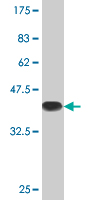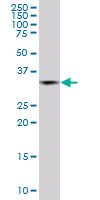PCGF2 Antibody (monoclonal) (M04)
Mouse monoclonal antibody raised against a partial recombinant PCGF2.
- 产品详情
- 实验流程
- 背景知识
Application
| WB |
|---|---|
| Primary Accession | P35227 |
| Other Accession | BC004858 |
| Reactivity | Human, Rat |
| Host | mouse |
| Clonality | monoclonal |
| Isotype | IgG2a Kappa |
| Clone Names | 4C10 |
| Calculated MW | 37788 Da |
| Gene ID | 7703 |
|---|---|
| Other Names | Polycomb group RING finger protein 2, DNA-binding protein Mel-18, RING finger protein 110, Zinc finger protein 144, PCGF2, MEL18, RNF110, ZNF144 |
| Target/Specificity | PCGF2 (AAH04858.1, 236 a.a. ~ 294 a.a) partial recombinant protein with GST tag. MW of the GST tag alone is 26 KDa. |
| Dilution | WB~~1:500~1000 |
| Format | Clear, colorless solution in phosphate buffered saline, pH 7.2 . |
| Storage | Store at -20°C or lower. Aliquot to avoid repeated freezing and thawing. |
| Precautions | PCGF2 Antibody (monoclonal) (M04) is for research use only and not for use in diagnostic or therapeutic procedures. |
For Research Use Only. Not For Use In Diagnostic Procedures.
Provided below are standard protocols that you may find useful for product applications.
BACKGROUND
The protein encoded by this gene contains a RING finger motif and is similar to the polycomb group (PcG) gene products. PcG gene products form complexes via protein-protein interaction and maintain the transcription repression of genes involved in embryogenesis, cell cycles, and tumorigenesis. This protein was shown to act as a negative regulator of transcription and has tumor suppressor activity. The expression of this gene was detected in various tumor cells, but is limited in neural organs in normal tissues. Knockout studies in mice suggested that this protein may negatively regulate the expression of different cytokines, chemokines, and chemokine receptors, and thus plays an important role in lymphocyte differentiation and migration, as well as in immune responses.
REFERENCES
BMI1 and Mel-18 oppositely regulate carcinogenesis and progression of gastric cancer. Zhang XW, et al. Mol Cancer, 2010 Feb 21. PMID 20170541.The novel tumor-suppressor Mel-18 in prostate cancer: its functional polymorphism, expression and clinical significance. Wang W, et al. Int J Cancer, 2009 Dec 15. PMID 19585577.Mel-18 interacts with RanGAP1 and inhibits its sumoylation. Zhang J, et al. Biochem Biophys Res Commun, 2008 Oct 17. PMID 18706886.A phosphorylated form of Mel-18 targets the Ring1B histone H2A ubiquitin ligase to chromatin. Elderkin S, et al. Mol Cell, 2007 Oct 12. PMID 17936708.Violating the splicing rules: TG dinucleotides function as alternative 3' splice sites in U2-dependent introns. Szafranski K, et al. Genome Biol, 2007. PMID 17672918.
终于等到您。ABCEPTA(百远生物)抗体产品。
点击下方“我要评价 ”按钮提交您的反馈信息,您的反馈和评价是我们最宝贵的财富之一,
我们将在1-3个工作日内处理您的反馈信息。
如有疑问,联系:0512-88856768 tech-china@abcepta.com.























 癌症的基本特征包括细胞增殖、血管生成、迁移、凋亡逃避机制和细胞永生等。找到癌症发生过程中这些通路的关键标记物和对应的抗体用于检测至关重要。
癌症的基本特征包括细胞增殖、血管生成、迁移、凋亡逃避机制和细胞永生等。找到癌症发生过程中这些通路的关键标记物和对应的抗体用于检测至关重要。 为您推荐一个泛素化位点预测神器——泛素化分析工具,可以为您的蛋白的泛素化位点作出预测和评分。
为您推荐一个泛素化位点预测神器——泛素化分析工具,可以为您的蛋白的泛素化位点作出预测和评分。 细胞自噬受体图形绘图工具为你的蛋白的细胞受体结合位点作出预测和评分,识别结合到自噬通路中的蛋白是非常重要的,便于让我们理解自噬在正常生理、病理过程中的作用,如发育、细胞分化、神经退化性疾病、压力条件下、感染和癌症。
细胞自噬受体图形绘图工具为你的蛋白的细胞受体结合位点作出预测和评分,识别结合到自噬通路中的蛋白是非常重要的,便于让我们理解自噬在正常生理、病理过程中的作用,如发育、细胞分化、神经退化性疾病、压力条件下、感染和癌症。







